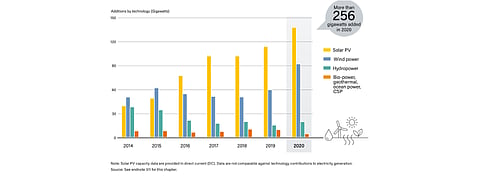

Global renewable energy think tank Renewable Energy Policy Network for the 21st Century (REN21) believes the world is nowhere near the paradigm shift towards a clean, healthier and more equitable energy future since the planet's biggest polluters—G20 nations—'barely met or even missed their 'unambitious renewable energy targets. 15 out of G20 members did not have a 2020 renewable energy target.
In its Renewables 2021 Global Status Report, REN21 authors said while annual additions of renewable energy capacity have been increasing consistently with more than 256 GW installed in 2020 alone, led by solar PV technology, the share of renewable energy has only increased slightly (8.7% in 2009 to 11.2% in 2019) in final energy consumption. On the other hand, the share of fossil fuels in the total energy mix (now 80.2%) hasn't really changed much since a decade ago when it was 80.3%.
It hails the progress made by the power sector for absorbing more and more renewable energy capacity thanks to technological advancements leading to falling costs of wind and solar PV. But it bluntly states, "Shifting from fossil fuels to renewable energy is a necessary step to take and making renewables the norm is not a question of technology or costs."
For solar PV, the report sees its clout growing as the most competitive option for electricity generation for all segments, while pointing out challenges for it to address to become a major electricity source globally. "In most countries, there is still a need for adequate regulatory frameworks and policies governing grid connections to overcome cost or investment barriers in some markets and to ensure a fair and level playing field."
Even though some countries have pledged big targets for their renewable energy uptake, but these need to be supported by incentivizing and/or mandating their use while actively phasing out fossil fuel and their subsidies.
The year 2020 with the COVID-19 pandemic should have been the year for the world to have pushed the reset button for global climate economy and renewables, but recovery packages provide 6 times more investment to fossil fuels than to renewables, according to the report.
"Governments must not only support renewables but also rapidly decommission fossil fuel capacity. A good way to accelerate development is to make the uptake of renewable energy a key performance indicator for every economic activity, every budget and every single public purchase," said REN21's Executive Director, Rana Adib. "Thus, every ministry should have short- and long-term targets and plans to shift to renewable energy coupled with clear end-dates for fossil fuels."
The REN21 report is available for free viewing and download on its website.
